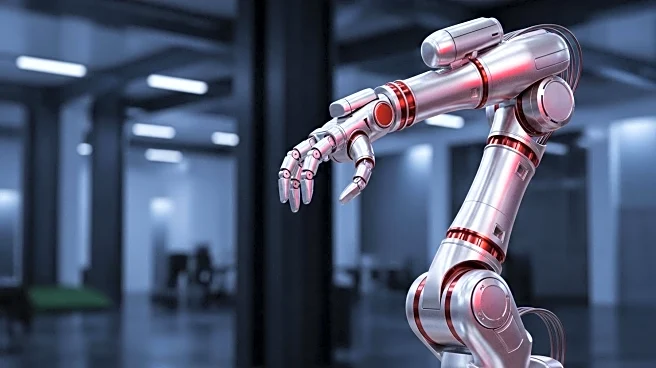What is the story about?
What's Happening?
China has surpassed the rest of the world in the number of industrial robots, marking a significant milestone in the global automation industry. According to the International Federation of Robotics, China installed approximately 290,000 industrial robots in 2023, valued at $14.5 billion. The market is characterized by fierce competition between global giants and local startups. Foreign companies like Fanuc, Yaskawa, ABB, and Kuka have established production facilities in China, leveraging a 'in China, for China' strategy to dominate the market. However, the acquisition of Kuka by Chinese company Midea in 2017 shifted the landscape, propelling Chinese-owned robotics companies into the market. Domestic brands like Siasun and Estun are gaining market share, driven by government initiatives and competitive pricing.
Why It's Important?
China's dominance in the industrial robotics market has significant implications for global manufacturing and automation. The shift towards local production and innovation challenges the established presence of foreign giants, potentially altering the balance of power in the industry. Chinese companies are rapidly innovating, developing competitive collaborative robots and AI-enhanced systems. This growth is supported by government initiatives like 'Made in China 2025,' which provide subsidies and incentives for domestic manufacturers. The increasing market share of Chinese brands signals a profound change in the industry's structure, impacting global supply chains and manufacturing practices.
What's Next?
The trajectory suggests that Chinese-branded robots will continue to increase their market share, potentially surpassing 50% of domestic unit sales in the coming years. Chinese manufacturers are expected to solidify their hold on the domestic mass market, while foreign giants may focus on high-margin applications where their technological lead is most pronounced. The most probable scenario is one of coexistence and continued stratification, with foreign companies leveraging their global brands and R&D capabilities. The outcome of this intense competition within China will ultimately redefine the balance of power in global manufacturing for decades to come.
Beyond the Headlines
The rise of China's industrial robotics market raises ethical and strategic questions about intellectual property, innovation, and global competition. The acquisition of Kuka by Midea highlights the strategic importance of robotics to China's national interests, prompting increased investment and ambition in domestic players. This shift may lead to increased scrutiny and regulatory challenges for foreign companies operating in China. Additionally, the rapid growth of the market may impact employment patterns and workforce dynamics, as automation replaces traditional manufacturing roles. Addressing these challenges is crucial for ensuring sustainable and responsible growth in the industry.
















